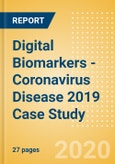Summary
The ongoing COVID-19 crisis has seen social distancing and lockdown measures implemented around the world, which has had widespread effects on the healthcare industry, particularly in the ways that patients and healthcare professionals can safely interact while minimizing risks of viral transmission. Remote patient monitoring and the collection of digital biomarkers by connected devices has emerged as an important approach to support patients and healthcare systems during the pandemic. This case study assesses how connected devices and digital biomarkers can be used during the COVID-19 pandemic and beyond.
Key Highlights
Scope
Reasons to Buy
The ongoing COVID-19 crisis has seen social distancing and lockdown measures implemented around the world, which has had widespread effects on the healthcare industry, particularly in the ways that patients and healthcare professionals can safely interact while minimizing risks of viral transmission. Remote patient monitoring and the collection of digital biomarkers by connected devices has emerged as an important approach to support patients and healthcare systems during the pandemic. This case study assesses how connected devices and digital biomarkers can be used during the COVID-19 pandemic and beyond.
Key Highlights
- Digital biomarkers are an important addition to the armamentarium of tools supporting patients and healthcare systems during the COVID-19 pandemic: Digital biomarkers such as temperature, respiratory rate, coughing, and heart rate can be easily and continuously tracked using connected devices to identify patients at risk of COVID-19, assess disease progression, and monitor symptoms. Like telemedicine, the COVID-19 pandemic could lead to the widespread use of this technology across a number of areas, particularly chronic disease.
- Digital biomarkers and RPM technology could be used as a strategy to predict and prevent disease outbreaks in the future: Using digital biomarkers as a prevention strategy has potential in other infectious disease outbreaks that may occur in the future. These data can easily be tracked among the general population as an early warning system to predict hotspots, in order to rapidly prevent widespread outbreaks and transmission.
- COVID-19 could be the tipping point for widespread implementation of virtual trials: As has been widely touted for telemedicine, the use of RPM in clinical trials could surge as a result of the COVID-19 crisis. The benefits of collecting patient data remotely will be realized outside of COVID-19, particularly the removal of common recruitment barriers, such as distance to trial sites and travel expenses, leading to more efficient and cost-effective clinical trials for sponsors.
Scope
- This case study assesses how digital biomarkers can be used to:
- Track COVID-19 patients, as well as those at risk of contracting the virus
- Predict COVID-19 outbreaks
- Mitigate the impact of COVID-19 on clinical trial delays during social distancing and lockdown measures
Reasons to Buy
- Get an overview of the opportunities that exist for the use of connected devices and digital biomarkers in remote patient monitoring during the COVID-19 pandemic and beyond.
- See how digital health companies are utilizing their technology to help combat the COVID-19 crisis
Table of Contents
Use of Digital Biomarkers to Track COVID-19 Patients and Predict Outbreaks- Use of RPM Strategies During the Pandemic
- Huma
- Biofourmis
- Oura
- Kinsa Health
- Scripps Institute DETECT Study
- Using Digital Biomarkers to Mitigate the Impact of COVID-19 on Clinical Trials
- Impact of COVID-19 Social Distancing Measures on Clinical Trials
- Adoption of Virtual Trials During the COVID-19 Crisis
- Digitization of Clinical Trials Is Increasing
- Key Takeaways
Appendix
- Methodology
- Abbreviations
- Related Reports
- About the Authors
- About the Publisher
Companies Mentioned (Partial List)
A selection of companies mentioned in this report includes, but is not limited to:
- Medopad (now Huma)
- Biofourmis
- Oura Health
- Kinsa Health
- Scripps Research Translational Institute








